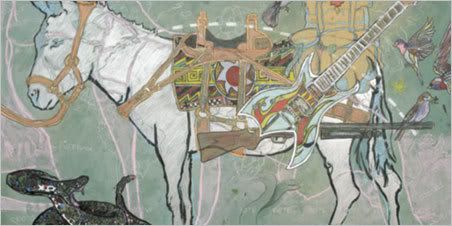
“Lazy Suicide“
from the album Bury the Square
2008
iTunes
The story of Bon Iver is fairly well known. Frontman Justin Vernon and his old band, DeYarmond Edison, moved to North Carolina in search of a transformative push. But instead of transporting the old band to a new level, the move broke it up. Vernon went back to Wisconsin, recorded Bon Iver’s For Emma, Forever Ago by himself, and became a blog favorite. What is less well known is what happened to the rest of the old band, Phil Cook, Brad Cook, and Joe Westerlund. They became Megafaun, and if they do not quite garner the mass adulation that Bon Iver has attracted, they are doing something at least as interesting, maybe more so.
Bury the Square, Megafaun’s first album, neatly balances the old-time rigors of country and gospel with the free-floating experimentation of rock, jazz, and improvised music. Consider, for instance, how opener “Find Your Mark” starts with the effortful earnestness of three-part harmonies, then melts midway through, into jazz-tinged scatting vocals, like the Stanley Brothers riffing over a Stereolab drone. Or conversely, how “Tired and Troubled” begins with tape hiss and half-heard samples, field sounds, and squiggles of electronics, then slowly coalesces into mournful, traditional harmonies. Or how the lengthy “Where We Belong” follows a linear path of banjo through unearthly swells of vocal harmonies, sweet post-classical unspoolings of violin tones, screeches of feedback and serene flourishes of piano. There is always a down-home thread running through these songs, but it wanders into the most unusual corners.
Megafaun’s sound oscillates between the righteous certainty of gospel and the more melancholy gentleness of finger-picked folk. Banjo player Phil Cook’s voice and style of playing is more strident than his brother’s, and the songs where he takes the lead — “Find Your Mark” and “Lazy Suicide” — reference bluegrass. “Drains,” the quietest song (and the one dead-ringer for touring partners Akron/Family), showcases Brad Cook’s singing, which is more haunting and less forceful. Yet perhaps the band’s signature sound comes when all three members sing together, in close, rough-edged harmonies, just a little too hard and rock-tinged to be really traditional.
The other thing that separates this band from their traditional roots — as important maybe as their free-form improvisatory interludes — is that they do not really partake of the religious certainty of gospel. The most traditional-sounding song, “His Robe,” could come from a ’30s gospel radio show. Yet the story is mainly about asking Jesus to save a sick child and getting no answer. “I called Lord, come restore / but my cries weren’t heard,” the lyrics go. It is a miracle play without the miracle, a gospel song without any good news. And that is, maybe what’s strangest and most interesting about this band, that they do the traditional elements so well — the banjo, the harmonies, the straight-up rhythms — while remaining fully modern.
Moreover, this is a band that is still finding itself. Bury the Square is a worthy effort, but nowhere near as good as the band’s live show, which splices long samba-ish percussive intervals into old-time songs, and foments group sing-alongs in three-part harmonies. Not quite mega, but getting there.
